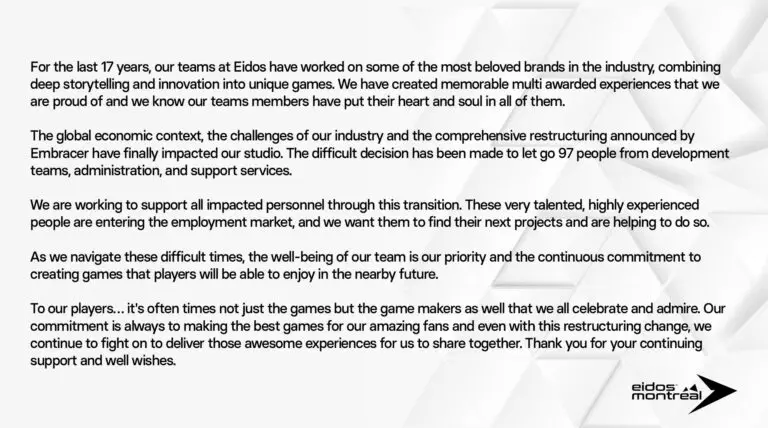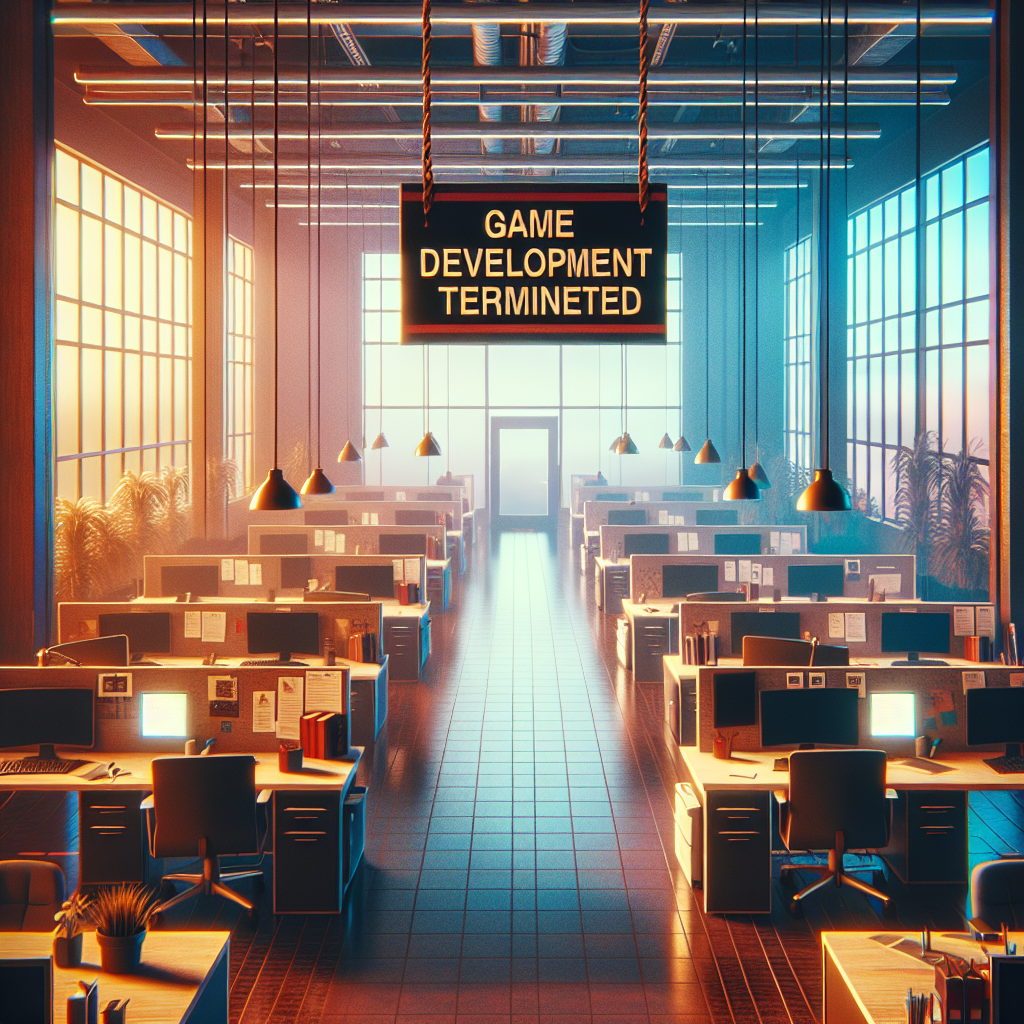Announcement by Eidos Montreal
Eidos Montreal, the studio behind the Adam Jensen-led Deus Ex series and the 2021 game Guardians of the Galaxy, has made a significant announcement regarding its workforce. The developer has laid off a total of 97 employees from various departments, including development teams, administration, and support services. This move comes in tandem with the cancellation of a previously unannounced Deus Ex game that was in the works.
The studio did not officially confirm the existence or the cancellation of the Deus Ex project in its announcement. However, reports suggest that the game had been in development for approximately two years and was poised to move from pre-production to full development this year. Despite these setbacks, Eidos Montreal is not closing its doors entirely and is reportedly still working on another unannounced game that is not tied to any existing intellectual property.
The voice actor for the protagonist of the reboot series, Adam Jensen, Elias Toufexis, commented on the situation with a tweet expressing his earlier skepticism about a new Deus Ex game being in development:
I told you guys it wasn’t happening.
— Elias Toufexis (@EliasToufexis) March 25, 2024
Toufexis further shared his thoughts, indicating that he had not been under any non-disclosure agreement and had not been contacted about a new Deus Ex game, confirming that the project would indeed not be moving forward.
The gaming industry has been facing a challenging period, with numerous developers affected by layoffs. The cancellation of the Deus Ex game and the layoffs at Eidos Montreal are part of this broader industry trend.

(Image credit: Eidos Montreal)
Background of the Canceled Deus Ex Project
The Deus Ex franchise has a storied history, and the recent cancellation of its latest installment has left fans and industry insiders searching for answers. The now-canceled Deus Ex game had been in development for two years, with its inception likely occurring just before or immediately after Eidos Montreal’s acquisition by the Embracer Group in 2022. The project was reportedly ready to transition from pre-production to full development in the year it was canceled.
| Year | Event |
|---|---|
| 2022 | Acquisition of Eidos Montreal by Embracer Group |
| 2022-2024 | Deus Ex game in development for two years |
| 2024 | Cancellation of the Deus Ex game |
The timeline above highlights the key milestones in the development of the canceled Deus Ex project. Despite the unfortunate cancellation, the game’s development period shows the potential that Eidos Montreal saw in reviving the beloved franchise.
Eidos Montreal’s Current Projects
Despite the recent layoffs and the cancellation of the unannounced Deus Ex game, Eidos Montreal is still actively working on new projects. The studio is currently developing a game that is not associated with any pre-existing intellectual property (IP).
- The project is an unannounced game.
- It is not attached to any pre-existing IP.
- The game’s details remain under wraps.
This new direction for Eidos Montreal signifies a fresh start and an opportunity to create something unique in the gaming landscape. The studio’s commitment to innovation and creativity remains strong, even as it navigates through the challenges of the industry.
Embracer Group’s Acquisitions and Impact
The Embracer Group has been known for its aggressive acquisition strategy, which included the purchase of Eidos Montreal, as well as other notable studios such as Crystal Dynamics and Square Enix Montreal. The latter was immediately shuttered following the acquisition. These moves were part of Embracer’s spending spree during 2021 and 2022, which aimed to consolidate its position in the gaming industry.
The impact of these acquisitions has been significant. While there was hope that Embracer Group would be a better steward for these developers compared to their previous owner, Square Enix, the reality has been somewhat different. The Swedish conglomerate has faced its own challenges, with a decline that began last year, leading to layoffs across its workforce.
The acquisition of Eidos Montreal by Embracer Group was initially seen as a potential new beginning for the studio, especially with rumors of a new Deus Ex game in development. However, the recent layoffs and project cancellations have cast a shadow over the future of the studio and its projects.
Embracer’s strategy has had a mixed impact on the gaming community and the industry as a whole. While it has led to the consolidation of many beloved studios under one umbrella, it has also resulted in the closure of some studios and the cancellation of anticipated projects, leaving fans and developers alike uncertain about what the future holds.
Industry Context and Impact on Deus Ex Series
The gaming industry has been experiencing a period of significant upheaval, with the Embracer Group’s decline being a notable example. The conglomerate’s financial troubles have led to widespread layoffs, affecting thousands of developers across the industry. This “industry malaise” has been particularly brutal, with no immediate end in sight.
The Deus Ex series, once a staple of the PC gaming community, has been directly impacted by these industry challenges. The cancellation of the latest Deus Ex project not only marks a disappointing turn for fans but also highlights the broader issues facing game developers. The series, known for its rich storytelling and immersive gameplay, has been left in limbo, with its future uncertain.
The gaming community has expressed frustration over the squandering of the Deus Ex franchise, as it represents a loss of potential for both the series and the genre. The Embracer Group’s current situation has diminished the excitement for upcoming projects, leaving gamers concerned about the fate of their favorite titles.
As the industry continues to navigate through these turbulent times, the hope is that developers like Eidos Montreal can find a way to rebound and continue creating compelling gaming experiences. However, the current trend of layoffs and project cancellations serves as a stark reminder of the volatility of the gaming industry.

